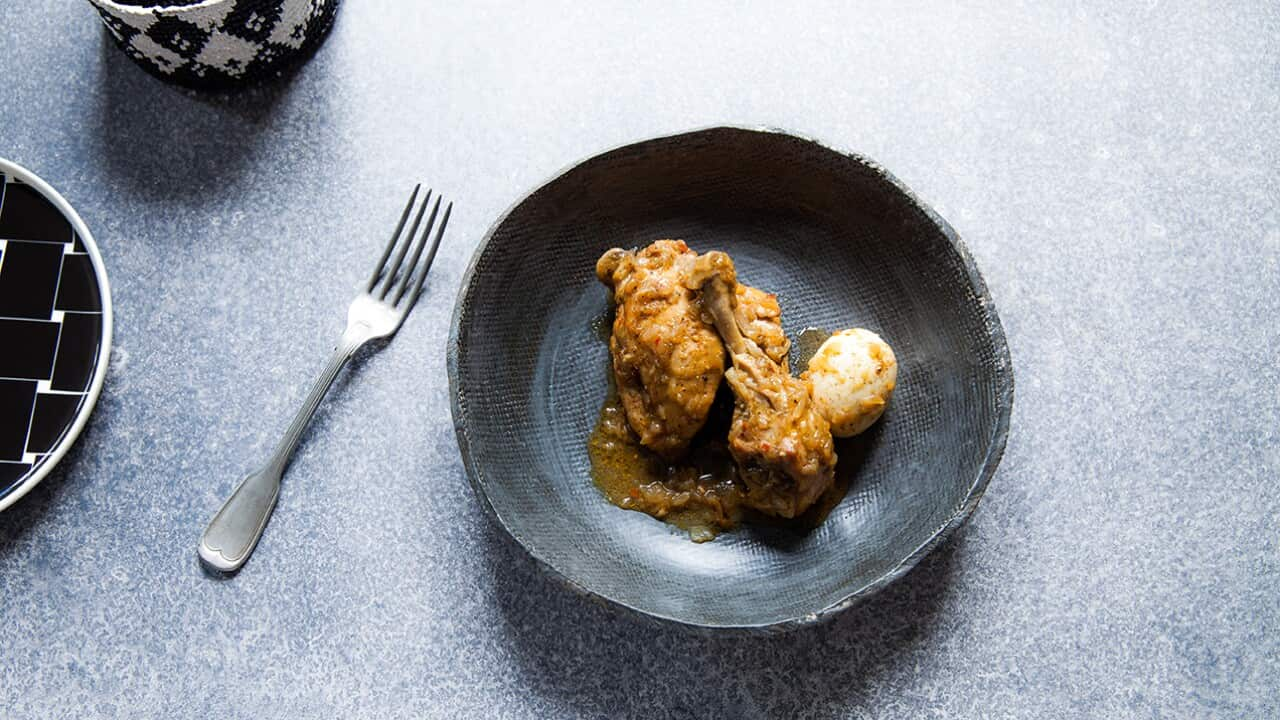The aroma of food that drifted from Sara Taddesse's house was so alluring, it attracted strangers to her home.
A man on lawnmower-duty nearby had to stop cutting the grass. He ended up walking over and knocking on the window to ask what was simmering on the stove. "Can I try some, if I'm not rude?"
He wasn't the only person who was drawn to their kitchen.
"People passing on the street even said, 'oh my God, your cooking!'" says Taddesse.
She could relate – even she couldn't resist the Ethiopian dishes that her mother, Amarech Desta, served at home.
When her mum made , a spiced chicken stew, "we'd usually say, 'can we have the sauce before you cook the chicken?'" They'd tried to steal a spoonful or get away with a cupful of the ultra-flavoursome, slow-cooked sauce.
"I love doro wat," says Taddesse. "That's a special dish for most Ethiopian people." Especially as it only appears at holidays, like Christmas or Easter. It's often referred to as the country's .
THIS IS WHAT ALL THE FUSS IS ABOUT

Ethiopian red chicken stew (doro wat)
Her family is originally from , the capital of Ethiopia, but because her father was a victim of political persecution, "it wasn't safe for him", she says. "He had to go to another country, which is Egypt, then he got the visa to come to Australia." They joined him afterwards and settled as refugees in Wollongong, an hour outside of Sydney.
It was there that her mother's food gained a new audience – and fan club.
"My mum always cooked at home and whoever tried her food would say, you should do this as a business," says Taddesse.
There was community demand for Ethiopian food. Locals were travelling an hour away to Sydney, just to get their closest fix of the cuisine. "Some people even go to Canberra." If people were willing to spend nearly six hours in a car to enjoy some bread and doro wat, why not offer it in Wollongong? Particularly for refugees missing the flavours of their homeland?
People were like, 'girl you need to start making more because we keep coming in'.
Her mum would produce injera bread from scratch, often using organic teff she'd ordered from Ethiopia. But if the latest shipment hadn't arrived, she'd mix in some Indian flour from a local grocer to achieve the spongey, airy texture of the tangy flatbread. "She knows how to make it the traditional way."
The spiced doro wat stew – and its beef counterpart (sega wat) – would be slow-cooked the night before each market appearance. Then the pair would get up at 5am to prep vegetable dishes – such as the sauteed spinach (gomen), turmeric-golden cabbage with potatoes and carrots (tikel gomen), beetroot and potato salad (kay sir) and spiced lentil stew (misir wat).
The tikel gomen was especially popular. "It's people’s favourite dish at the market," says Taddesse. It had an entrancing smell that drew people from long distances. "Kids and people will be like, 'oh my god, what is that?'" Her mother's food just had that hypnotic effect – on lawnmower operators and market-goers alike.
It was also a hit with the Ethiopian community, who no longer had to fill up their petrol tank and put on a long driving soundtrack to track down injera and well-spiced stews.
But the market stall also convinced some sceptics, too. Some people weren't willing to try an "unfamiliar" cuisine until their friends talked them into it. "They said, 'you know what, we’ll pay for you, you try it and if you don't like it, you can give it to us'." They sampled the food – and found it so delicious that they immediately asked for more to take away.
"When I started it, not many people knew the food," says Taddesse. "I was serving food with a slow-cooker, I had no labels, I had nothing." All she had was a table and her tiny market-stall tent – but her stall was a success. On her first day, her dishes sold out long before closing time. And she kept selling out at the market.
"People were like, 'girl you need to start making more because we keep coming in, we can't find the food!'"
Soon, she was selling triple the amount of dishes she started with. At home, her mother had to make so much injera that one of their tables was piled high with 80 fresh-made flatbreads, waiting to be sold.
Because of COVID-19-related precautions, though, Taddesse has chosen to stop trading at the markets. "I'm waiting until it's safe," she says.
So she's focusing on takeaway and catering orders instead. And people aren't holding back: one customer recently ordered 10 injera flatbreads and five serves of doro wat. So instead of following the scent of her family cooking to Taddesse's home, you can wait for it to be delivered to your house.
As for Taddesse, one upside of pandemic trading has been spending more time at home with her mother.
It's "connected us", she says. "It gives me time to know her secret ingredients and cooking skills."
To order from Ethiopian Cuisine, call 0470 135 233 or email . You can follow Ethiopian Cuisine on .
ETHIOPIAN FOOD HIGHLIGHTS

Saba Alemayoh will cook for you like family at her Ethiopian Fitzroy eatery








